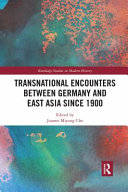
Transnational Encounters Between Germany and East Asia Since 1900 PDF
248 Pages·2020·2.6303 MB·other
Most books are stored in the elastic cloud where traffic is expensive. For this reason, we have a limit on daily download.
Preview Transnational Encounters Between Germany and East Asia Since 1900
Description:
This volume contributes to an emerging field of Asian German Studies by bringing together cutting-edge scholarship from international scholars working in a variety of disciplines. The chapters survey transnational encounters between Germany and East Asia since 1900. By rejecting traditional dichotomies between the East and the West or the colonizer and the colonized, these essays highlight connectedness and hybridity. They show how closely Germany and East Asia cooperated and negotiated the challenges of modernity in a range of topics, such as politics, history, literature, religion, environment, architecture, sexology, migration, and sports.
See more
The list of books you might like
Most books are stored in the elastic cloud where traffic is expensive. For this reason, we have a limit on daily download.
